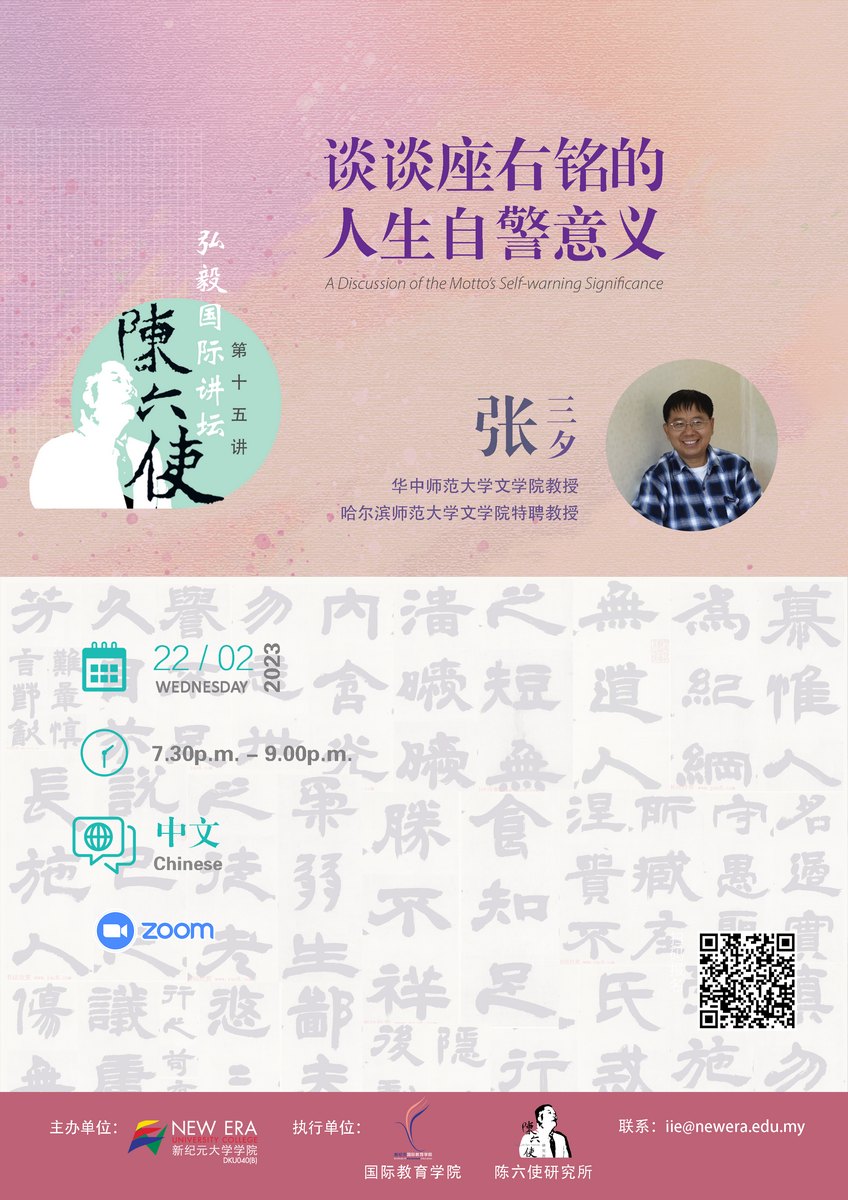[15th Talk] Professor Dr. Zhang Sanxi: “A Discussion of the Motto’s Self-warning Significance”
Upcoming Event

|
Introduction |
The fifteenth talk of the “Tan Lark Sye Lecture Series” will take place next week. In Prof. Zhang Sanxi’s speech, he primarily focused on inner self-cultivation, a specific style of inscription in traditional Chinese “introspection” culture, the origins of “motto”, with a detailed of interpretation of classic texts. According to speaker, the role of “self-warning” (self-warning, self-warning) can be extremely useful, as they are highly suggestive (visible), practicable, and referable. As a result, individual principles for dealing with people might be developed, as well as our life's meaning might be clarified and strengthened. |
|
Speaker |
Prof. Zhang Sanxi (Professor at the College of Chinese Language and Literature, Central China Normal University, Distinguished Professor at the College of Chinese Language and Literature, Harbin Normal University) Prof. Zhang holds a Master's degree in Literature and a Doctorate in History. He has held various academic positions, including Lecturer in Classical Literature at Hubei University; Associate Professor at the Institute of Historical Literature, Central China Normal University; Professor at the Social Science Research Center, Hainan University, and Professor of Classical Literature and Associate Dean of the College of Literature at Hainan University; Professor and PhD supervisor (with a focus on Classical Philology and Cultural Studies) at the College of Chinese Language and Literature, Central China Normal University, and Associate Dean of the National Studies Institute; and Distinguished Professor at the College of Chinese Language and Literature, Harbin Normal University. In 2009, he served as an exchange professor for half a year at the Department of Chinese Language and Culture at Kyungnam University in South Korea. He has participated in academic exchanges and research visits in over ten countries. Professor Zhang has long been engaged in teaching and research in the field of Chinese literature and history at universities. He has published over one hundred papers in journals such as Literary Heritage, Chinese Culture, Literary and Art Studies, and Philosophical Studies. His published works include several books: Critique of Historical Studies (1992, 2010), Thoughts on Death and Poems of Death (1993), The Personal Path to History (2001), Poetry and Experience (2008), The "Final Texts" of the 20th Century (2009), Modernity and Contemporary Art (2013), On the Road (2017), Selected Readings in Classical Chinese Studies (2022), and others. He has also served as the editor for works such as Eastern Culture and Modern Civilization (2000), Chinese Classical Philology (2003, 2007, 2018), The Chinese Ancient Texts Digital Resources and Research Notes (2015), Media and History (2017), and Selected Inscriptions from Chinese Tombstones through the Ages, among others. Chinese Classical Philology was awarded the National-level Excellent Textbook by the Ministry of Education of China and is used in numerous universities across China. |
|
Moderator |
Assoc. Prof. Tey Shi Bin (Dean of the International Education College at New Era University College cum Director, Department Marketing and Sales) Assoc. Prof. Tey Shi Bin graduated with a First-Class Honours Bachelor's degree in Chinese Studies from the University of Malaya. She was jointly recommended by the Chinese Embassy in Malaysia, the Ministry of Higher Education of Malaysia, and the Department of Chinese Studies at the University of Malaya to receive the "Chinese Government Full Scholarship" for further studies in China. In 2010, she completed her Master's degree in Chinese Classical Literature at Central China Normal University in China, earning honors for an excellent thesis and being named an outstanding international graduate student. In 2014, she received her Ph.D. in Classical Philology from the same institution, again being recognized for her outstanding thesis and for her excellence as a graduating international student. |
|
Information |
Date: 22 February 2023 (Wednesday) |
Trailer (Video)
Lecture Postscript
The 15th session of the "Tan Lark Sye Lecture Series," organized by the Institute of International Education, New Era University College (IIE, NEUC) and the Tan Lark Sye Institute, was held on 22th February 2023. The guest speakers for this event was Professor Dr. Zhang Sanxi, from the School of Literature at Central China Normal University and a distinguished professor at the School of Literature at Harbin Normal University. It was attended by more than 200 people.
The keynote speaker, Prof. Dr. Zhang Sanxi, is a professor at the School of Literature at Central China Normal University and a distinguished professor at the School of Literature at Harbin Normal University. He holds a master's degree in literature and a Ph.D. in history. He has served as a lecturer in classical literature at Hubei University, an associate professor at the Institute of Historical Documents at Central China Normal University, a professor at the Social Science Research Center of Hainan University, a professor of classical literature and vice dean of the School of Literature at Hainan University, and a professor and doctoral advisor at the School of Literature at Central China Normal University. His areas of expertise include classical philology and cultural communication studies. Dr. Zhang has long been engaged in teaching and research in the fields of Chinese literature and history at various universities.
This lecture was titled “A Discussion of the Motto’s Self-warning Significance”. In this lecture, Prof. Dr. Zhang Sanxi focused on the concept of internal self-cultivation, discussing the Chinese traditional "self-reflection" culture through the specific literary form of inscriptions and the origins of the "motto." He also interpreted classic texts related to this topic and shared several personal motto recommendations. These mottos serve as effective tools for “self-alert” (self-warning and self-admonition), offering strong visibility, practicality, and adaptability. They help individuals establish principles for conduct and clarify and strengthen their sense of life purpose. The event was moderated by Assoc. Prof. Dr. Tey Shi Bin from NEUC. It received enthusiastic feedback, with the audience actively participating in the Q&A session and eagerly engaging in discussions.




